#karin boye
Explore tagged Tumblr posts
Text
wilhelm's obsession with karin boye is the best thing to happen to me. this unlabeled little guy obsessed with literature and stories written by a lesbian and her own struggle with religious trauma and his fidget toys and his little frog and fish doodles and his bounty obsession and the black headphones he just HAS to have a main character in a music video moment with every two weeks and his dramatic flip phone and his various gay scarves and the little green carnation symbol he wears to show that he's actually proud to be queer and his daily 'time to lift boyfriend' chores and the stupid sandwiches he makes and his little polaroid camera that is filled with photos of simon and his nail polish and his black hoodie that he wears at the slightest inconvenience just to feel emo..... I fucking love wilhelm so much
#wilhelm#prince wilhelm#simon eriksson#young royals#wilmon#wilhelm young royals#Karin Boye#i love wilhelm so much
361 notes
·
View notes
Text
For the Karin Boye stans among us this was Wille’s wall quote:
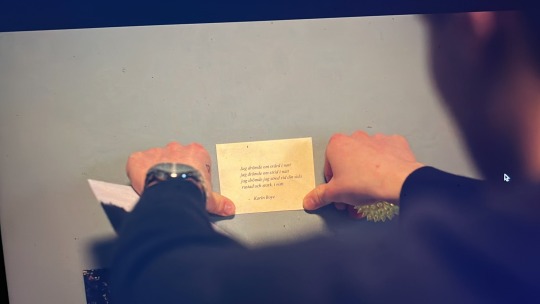
This is the first stanza of Karin Boye’s poem “Sköldmön” (Shield-Maiden) first published in 1924.
(Swedish)
Jag drömde om svärd i natt.
Jag drömde om strid i natt.
Jag drömde jag stred vid din sida
rustad och stark, i natt
(English)
I dreamt of swords last night.
I dreamt of battle last night.
I dreamt I fought by your side
armored and strong, last night.
629 notes
·
View notes
Text

The shield-maiden by Karin Boye
I knew I had to make Eowyn fanart about this poem the moment I read it because like. Hello??
(Original Swedish under the cut)

275 notes
·
View notes
Text
Wille's Crisis : an essay about Kris (1934) and Young Royals (2021)
While watching Young Royals’ third season, I couldn’t get Karin Boye’s novel Kris out of my head. As a fan of Young Royals that feels very chill and very normal about it, I have hence written a five page brain-dump on how Malin Forst and Wilhelm’s characters and worlds are intertwined. (Small disclamers : I’m quoting Amanda Doxtater’s 2020 english translation of the novel and I’m french-canadian, so english is my second language.)
Who is Karin Boye ?
Karin Boye (1900-1940) was a leading figure in Swedish modernist literature and poetry. In 1920, at the age of 20, she studied one year in Stockholm to become a primary school teacher and after graduation, continued teaching, writing, militant engagement and several years of study in related fields. Among all of her works, the most explicitly autobiographical is her autofictive novel Kris (1934). This powerful novel explores the homosexuality and crisis of religious faith of a young woman named Malin Forst.
Malin Forst & Wilhelm
During her studies in teaching, Karin’s 20-years-old alter-ego Malin goes through an existential crisis. She feels completely paralyzed by her guilt due to her selfish inaction in the face of universal suffering, her lack of trust in institutions (educational, medical, etc.) and, worst of all, her doubts about her relationship with God. Kris also deals with Malin’s relationship to her own sexuality with the meeting of a classmate, Siv, to whom she will become passionately obsessed without ever talking to her.
We meet 16-years-old Wilhelm as a first year student at Hillerska. His failures as a royal figure and his complicated relationships to his loved ones make him feel powerless and guilty. He is thrown off balance by his doubts of the monarchic system, but most importantly, by his doubts of his life’s role model, Erik. Young Royals also deals with Wilhelm’s relationship to his own sexuality with the meeting of a classmate, Simon… Are we seeing the parallels here ?
While Malin’s torments lead her to shut down, Wilhelm screams. But both feel paralysed and don’t know how to exist out of the system they grew up in. And it’s the meeting of a same-sex student that leads them to a freer path.
« I want to see Siv. I want to be where Siv is. »
Previously, Malin considered the fusion of the will of the human with the will of God to be the most important of aspirations. Without this reference point, she has no will nor desire… until she meets another student, Siv. Her simple presence rekindles for the first time in the novel a desire, burning and forbidden: “I want to see Siv. I want to be where Siv is.” … And here is how this whole essay has come to exist. While watching season three, I joked endearingly with my friends about the way that Wille’s only hobby is to be with Simon, but I felt sad for him. Until I understood he’s on the first part of his self-discovery journey. His first true desire that stems from inside of him and wasn’t imposed by the system is “I want to see Simon. I want to be where Simon is.”
Interestingly enough, Siv and Simon both become a new manifestation of something that Malin and Wilhelm have lost. We, the reader, meet Malin when she is ‘grieving’ her old relationship to God and deconstructing her understanding of God as a single entity. Amazed by Siv’s ‘perfection’, Malin raises her to a kind of divine position with great powers. Wilhelm, for his part, feels at home with Simon because of the way he makes Wilhelm’s entire being comes alive, weightless and playful… A feeling of joy, innocence and safety he’s only ever felt with Erik before.
Anxious and desperate, Malin and Wilhelm are latching to their comfort person, making them their whole word in a way that has to change for them to grow up. After realizing Siv’s feeling for a fellow male classmate, Malin is shaken : “Only now could she see that she had embarken upon the false path of mistaking a person for what is highest and most beautiful.” Not only does this quote mirror Wilhelm letting go of his idealised conception of Erik, it is also mirrorring his realisation that Simon is not a perfectly stable and unbreakable anchor on which he can blindly rely on : “I have to take responsibilities for my own problem. I can’t drag him down with me.”
Don’t give it a name
An important part of Malin’s journey is relinquishing the power she gives to words, especially regarding God and her sexuality. Throughout the novel, she refuses to name the emotion she feels for Siv. On the day of her meeting with Siv, Malin thinks: “You, lips, I implore you to clamp so hard upon the unsayable, that not a word slips out to assert its malicious pettiness and obfuscation ! Be still, thoughts, don’t interrupt, for you have no idea what this is ! (...) Don’t give it a name, let it be just as it is, here in my blood and my eyes, life and sap ! The wonder of new creation need not be named.”
Wilhelm’s complicated relationship to words is shown in the way that he shouts his love for Simon from every rooftop, but does not wish to label his sexual orientation. In season three, he says the word queer for the first time and his voice is seeped with discomfort. He is not claiming this word as part of his identity and rather feels constricted by it, probably in the same way that every other label put on him has made him suffocate.
Furthermore, both Malin and Wilhelm wish to express themselves and experience the world, not through the restrictive lens of language, but through the sensory world. In Kris, after seeing Siv for the first time, Malin’s five senses awaken. A dialogue takes place between the sense of sight and hearing, reminding me of the way that Wilhelm and Simon’s intimacy is developped through the gentle touch of noses, the sounds of breathing, the glow of golden light and fingers lingering slightly above the other’s body… ‘Sight’ says “I’m confused. I no longer know whether I am sight or not. I envelop things and follow them as if I were touch, I hold my breath in quiet anticipation as if I were hearing, I breathe in, like one intoxicated, as if I were smell, and I drink in long, deep, draughts as if I were taste. (...) Could I be standing at threshold of some new creation ?” To which ‘hearing’ responds “ (...) Admit it - isn’t revelation through the senses at the same time the revelation of what lies beyond the senses, of what creates the senses, of the limitless feelings of eternal love ? (...)”
Checkmate
Kris’s narration drastically changes points of view in unexpected moments, moving from the pov of human characters to the pov of abstract entities. The two most important are BLACK and WHITE, two sources of cosmic powers playing a chess game whose game board is humanity.
On the one hand, WHITE represents the norm, also illustrated by threats from nature such as stormy and dangerous waters, cold, humidity and darkness, but also under the traits of the dominant society, whose rules and norms protect human beings while maintaining them in a position of submission and obedience. WHITE uses the anxious desire of his pawns (humans) as a weapon to subject them to the norm. And at first, Wille is WHITE’s perfect pawn : an anxious mess who becomes more and more obediant as season three progresses and whose ‘protectors’ are also the ones leading to his demise. Little (most likely accidental) nods to that parralel : Wille looses to Alexander while playing the white pieces in season two and interrupts his conversation with Simon to scream “The water is cold today !” at his guards on their first date.
One the other hand, BLACK is a chaotic power of life associated with desire, burning fire and passion destabilizing the established order. In the context of Kris, the norm is heterosexuality, while fire is the forbidden desire: homosexuality. This parallel is evident when Malin describes in this way the physical sensations caused by Siv’s sight: “There was no holy, burning voice within her. All that burned within her was a thirst for the forbidden after a single look cast in that direction” And based on that, I absolutely refuse to believe that Lisa put the hallway scene after a BONFIRE by accident.
I also don’t think the placement of the chess game during August’s confession to his friends is a coincidence. First, the board is oriented in a way where August sits at the junction between the black and white pieces, showcasing how the character is in a crucial moment in his journey : will he stay in WHITE’s cruches for ever or will he find the strenght to save himself ? And second, August puts a black king on the edge of the table. Not only does it foreshadow that Kronprins Wille is on his way out, it also indicates that it was a rebel and homosexual ‘power’ that guided him in his quest for self-determination, just as it was for Malin Forst.
I natt gick Gud under or how to make the lake scene destroy me even more
The poem in prose I natt gick Gud under (Last night God succumbed) stands out from the other chapters of the novel Kris, as it recounts the most decisive transformation of the main character Malin Forst. BLACK places Malin naked and at peace on the shore of a sea where she throws the words she denies. Finally at a safe distance from WHITE’s icy waters, she liberates herself from her paralysis to embrace her true feelings.
Last night God succumbed.
Perhaps it was just the hollow shell of name that went under.
But that shell of a name drew with it the power of death. I cast it off.
I see objects as they are, unwitting of the name attributed to them. I cast off their names.
I stand utterly new, on the shore of a sea. Conscience is no longer mine. I cast it off.
The will to life has made me naked. The will to life has made me see. I shall meet whatever comes with naked, open eyes.
Lisa describes the lake scene as almost religious. As he’s swimming naked in the lake, Wilhelm is shedding his crown prince shell. Leaving the waters, he is reborn. When he is standing on the shore of the lake in his white clothes, Lisa says “that is when Wilhelm grows up.” And for me, he’s ready to meet whatever comes with naked, open eyes.
Thank you ! Thank you to whoever read this far. Kris is a very complex book that, despite having read twice, I still don’t fully understand, so if you have anything new to add to this reflection, you are welcome to do so !
#lisa i hope you're still lurking#wilmon#young royals#wilhelm x simon#young royals analysis#karin boye#young royals s3#literary analysis#lake scene#lisa ambjörn
167 notes
·
View notes
Text
how the poem on Wilhelm's wall foreshadows all of Young Royals S3 bc my YR brianrot won't go away

the poem is "The Shield-Maiden" by Karin Boye (the same author who wrote Crisis) and while we only see the first stanza, it's a lot longer. Here's the entire english translation.

I do think it’s important that the only part of this poem that we see in the show is the first stanza. It’s Wille’s perspective on what it means to have come out and be in a public relationship with Simon.
He’s romanticizing being with him and the “battle” he’s fighting against the expectations of the crown. He sees his love with Simon as armor that will protect him and arm him against the battle with his role as Crown Prince.

Simon is what makes him feel strong. For example, Wille wasn’t brave enough on his own to admit it was him in the video and it was only after Simon chose to be with him that he was strong enough to do so.

Stanza 2 continues his romanticizing of the reality of being in an openly queer relationship. The “giants that fell” is the ideal prince that he was expected to be. The court and tradition tries to keep them apart but their love was strong and bright to him like lightning.


The darkness is the burden the monarchy is putting on everyone in the royal family. Wille believes that he can escape the threat of this darkness by relying more on Simon (bonus that he joined the choir so they literally did sing together).


In Stanza 3 the POV switches to Simon. Where Wille dreamed of being public as something freeing, Simon had a taste of what the media would be like after the video and couldn’t dream of the same things as him. Instead of being “armored and strong” he dreams of “blood and death”.


Wille can dream about their love being armor against all of these things he’s already dealt with but Simon wasn’t ready for battle. In S3 we watch the court and media tear him down, the mortal wound is Simon having to delete himself (i.e. his instagram, writing songs & singing).


Stanza 4 starts with saying you didn’t even notice that I fell, you didn’t even notice that this battle is killing me. Even as we can all see that Simon is suffering, Wille can’t because he’s too distracted with the battle that he’s still fighting against his role.


“With steady hand the shield you held” Wille is still confident in their love’s ability to project him and he continues using it to help him get through his birthday dinner. He’s only brave enough to say all the things he does to his parents because Simon was by his side. (If you rewatch this scene you can notice Wille continually looking over at Simon for support.)


I see stanza 5 as the conclusion. The fire is Simon’s dream (or nightmare) and the dream of roses is Wille’s romanticizing of all of it. The third line is the death of their relationship/the end of the battle.



Wille has lost the battle but still won in a different way. He stops fighting to try and be the traditional crown prince he's expected to be. In the end this is what allows him to dream of Simon again.


Thank you for coming to my TED Talk 💀
#wilmon#young royals#wilhelm x simon#young royals analysis#karin boye#young royals s3#literary analysis#lisa ambjörn#wilhelm young royals#prince wilhelm#simon eriksson#simon young royals#i dont think anyone will read this but i wrote it so i might as well share it for the one or two people who will see it
110 notes
·
View notes
Text
help I accidentally found a Karin Boye poem for the lake scene

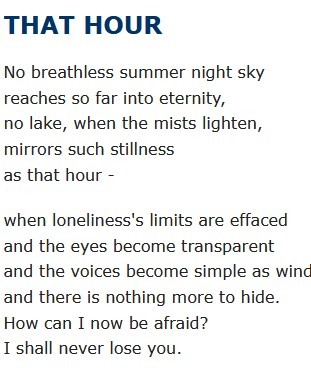
68 notes
·
View notes
Text
Could I follow you far away, further than everything you know, out into the loneliness of the world's outermost places, where the Galaxy unfurls a gaudy dead spume and where you seek a stronghold in heady rooms.
I know: it will not be.
But when you climb shivering blind from your christening, straight through space shall I hear your cry, to be new arms to you, to be close in another world to you amongst things with an unborn name.
~ Could I Follow You, Karin Boye (Translation to English by Jenny Nunn)
13 notes
·
View notes
Text
Forever thinking about how swedish lesbian author Karin Boye wrote dystopian novel Kallocain with plot, themes and motifs super similar to Orwell and 1984 and she wrote it in 1940!! my og dystopia queen
69 notes
·
View notes
Text
Menke | Moln
Se de mäktiga moln vilkas fjärran höga toppar Stolta, skimrande resa sig, vita som vit snö! Lugna glida de fram för att slutligen lugnt dö Sakta lösande sig i en skur av svala droppar Majestätiska moln - genom livet, genom döden Gå de leende fram i en strålande sols sken Utan skymmande oro i eter så klart ren, Gå med storstilat, stilla förakt för sina öden Vore mig det förunnat att högtidsstolt som dessa Kunna lyfta mig upp, dit ej världarnas jäkt når Och hur vredgat omkring mig än stormarnas brus går Bära solskimrets gyllene krans omkring min hjässa
See the mighty clouds, whose distant high peaks Proudly, shimmering rise, white as whitest snow! Calmly they glide forward, to finally peacefully die Slowly dissolving in a shower of cool drops Majestic clouds - through life, through death They walk forward, smiling in the light of a radiant sun Without dreary concerns, in ether so clearly pure Walk with grand, quiet contempt for their fates Would that I were blessed with grand pride like these Could they lift me up, where the worlds whir does not reach And how wrathful around me a storms' howl blows A golden wreath of twilight crowning my head

11 notes
·
View notes
Text
Top 10 reads of 2024
I haven't been as active here in 2024 as in other years, but I still feel like sharing my top 10 fo the year. No idea how, but I managed to read 52 books overall - the goal was 49 and I honestly thought I wouldn't reach it... Let's see which books were the best of the bunch to me :)
Kallocain by Karin Boye
Extremely beautiful dystopian novel. I feel like this is what people think 1984 is when they get disappointed by it (I'm saying this as a compliment). It's the story of a scientist who lives under an oppressive totalitarian state, and discovers a potent truth serum. 10/10, would recommend to everyone ever to read this.
2. Summer by Ali Smith
Don't ask me why I began reading the seasonal quartet from the last book, but so far this is the only one I read and... I loved it. It made me emotional in all the best ways. This has raised the stakes for the other three books of the series (I plan on reading Autumn in 2025 but why knows, might take me another two or three business years to actually do it).
3. All Men Are Mortal by Simone de Beauvoir
I think I should tell you that I picked up this book by chance from my mom's bookcase - as usual she knew she read it and remembered nothing of it. This novel felt like a slap in the face, and I don't understand how people can't always remember it after having read it. This is the story of an immortal man who regrets his immortality, and somehow it's an in-dept analysis of humankind's mortality and... I don't know how else to describe it if not the aforementioned slap in the face. Absolutely majestic.
4. The Biggest Prison on Earth by Ilan Pappé
This book should be mandatory in every school but alas. I don't think it's a good recommentation for people who never approached the subject of the history of Palestine, but I think it could still prove extremely useful to people who are interested in the topic - and let's face it, we all should be.
5. Act your age, Eve Brown by Talia Hibbert
Took me ages to finally finish the Brown sisters series, and I loved this third instalment just so much. I think Eve and Jacob are a great exaple of well written enemies to lovers - or whatever "sorry I accidentally run you over with my car, let me help you run your B&B" is supposed to be. It's my favorite trope and it better be done like this more often.
6. Velvet was the Night by Silvia Moreno-Garcia
I think I'll remember this novel for the wrong reason - it's so far the only book by Moreno-Garcia I didn't give 5 stars (I gave it a 4.75 so I should really just shut up). But I really enjoyed it, as it's written well, the characters are compelling, and it takes place in a moment in the history of Mexico I didn't know much about, which made it a good reason to do further research, something I always like. And, may I say? It has one of my favorite endings in all the Moreno-Garcia books.
7. From the River to the Sea: Essays for a Free Palestine ed. Sai Englert, Rosie Warren, Michal Schatz
Extremely upset I didn't have access to this while I was writing my Master's thesis (don't care if it has been published 2 years after my graduation ok). Please read this if you can.
8. Legendborn by Tracy Deonn
First book I read completely in 2024 and it was GREAT. I spent the year looking for Bloodmaker at my usual bookshop, but I will end up having to order it on their website. I need to know how the story goes, ok? This book wins the Best Plot Twist of the Year award to me (which means it's the best written, the one with the best build up, and not done for shock value).
9. Bite by Bite: Nourishment and Jamborees by Aimee Nezhukumatathil
World of Wonders, which I read a couple of years ago, is still one of my favorite books. This is basically the food version of it, so how could I not love this one too? it's so caring, so loving, so beautifully written: I can't ask anything else from a book.
10. Our wives under the sea by Julia Armfield
I'm not good with books that scare me. This scared me just enough to be able to finish it and still be so full of dread I could cry. If you're not a whimp like me you will probably think this is very tame, but to me the not knowing will always be more upsetting than the knowing.
Honorable mentions
I decided to put in the top 10 only books I read for the first time last year, but it was also a year I allowed myself some re-reads, which I think still deserve to be mentioned. Girl Woman Other by Bernardine Evaristo was maybe even better than I remember it, and I remember loving it dearly on the first read as well. Pride and Prejudice by Jane Austen and Mrs. Dalloway by Virginia Woolf, which I listened to as audiobooks but read ages ago, cemented themselves as some of my favorite classics.
#recap 2024#top 10 books 2024#kallocain#karin boye#summer#ali smith#all men are mortal#simone de beauvoir#the biggest prison on earth#ilan pappe#act your age eve brown#talia hibbert#velvet was the night#silvia moreno garcia#from the river to the sea: essays for a free palestine#sai englert#rosie warren#michal schatz#legendborn#tracy deonn#bite by bite#aimee nezhukumatathil#our wives under the sea#julia armfield#girl woman other#bernardine evaristo#pride and prejudice#jane austen#mrs. dalloway#virgina woolf
7 notes
·
View notes
Text
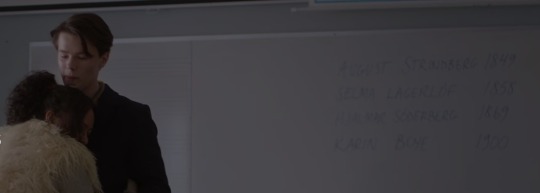
Hi, I'm new to Tumblr, new to the YR's fandom. Been lurking for a while. This is my first post. I obsess so much about this show. Not so healthy to be in such limerence, not getting so much work done lately. I took the obsession to a whole new level by subscribing to TV microscope's substack, getting a twitter account, an insta account etc. And it has just been feeding the obsession so far.
Anything to get some content.
Thanks for all these lovely insights. I've been reading an insane amount of stuff. I just refrained from reading the fanfic for lack of mental space.
Has someone a link to an analysis about the literary books that serve as intertextual reference in the show ? Apart form the Karin Boye reference, there is also a moment when Wille and Felice enter a classroom to clear the air after the awkward kiss. And there on the board, in capital letters, you have the list of the books they had to choose from (August Strindberg, 1849, Selma Lagerlof 1858, Hjalmar Soderberg 1869 and Karin Boye 1900. ) Can anyone link them to the show ?
Thanks in advance. I am not that versed in scandinavian authors (I had only heard about Stringberg).
#young royals#edvin ryding#omar rudberg#sweden#karin boye#wilmon#prince wilhelm#boris is the best 💜#wille
46 notes
·
View notes
Text


Eternity by Karin Boye: S3E6
15 notes
·
View notes
Text
Ja visst gör det ont // Yes, of course it hurts (poetic translation)
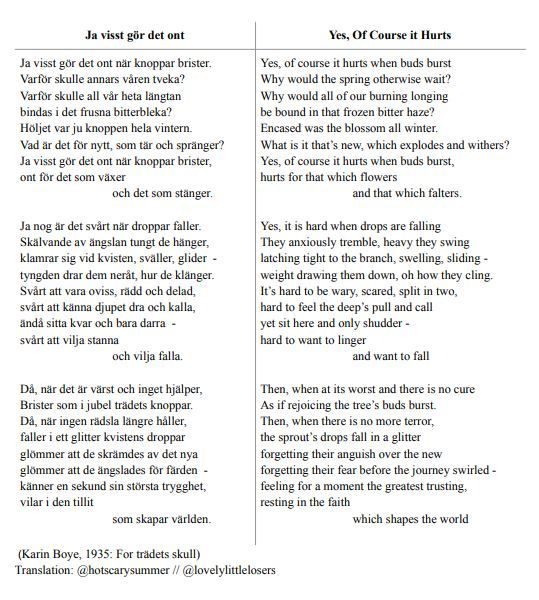
Ja visst gör det ont - Karin Boye (link to Karin Boye herself reading, c. 1935)
#i was writing this translation for a language symposium at my college and thought i'd post it here!#also saw a fic on ao3 in the yr tag using this as the title recently which was cool#karin boye#poetry#swedish#svenska#poetry translation#translation#my translation
32 notes
·
View notes
Text
'Kallocain' by Karin Boye has me in a chokehold
the way that there is no outright revolution, like in some other dystopian scifi's, but a quiet one, triggered by the deep longing to connect in a world that isolates and ostracises you from everyone you care for
Leo wanting to spread Kallocain, not to save himself, but to gift other people the opportunity to experience freedom under oppression
it's so fucking haunting
#anti-facist lesbian authors are my favourite kind of authors#kallocain was written YEARS before 1984 just as a note#kallocain#karin boye#bookblr#book club
2 notes
·
View notes
Text
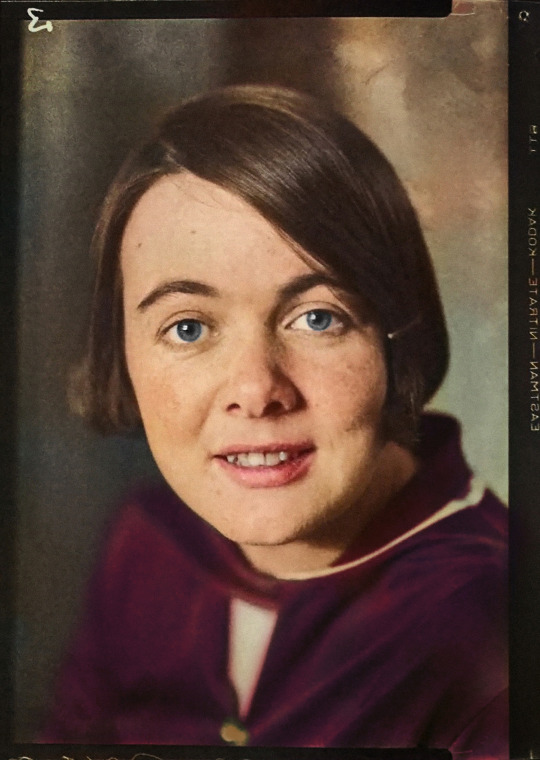
9 notes
·
View notes
